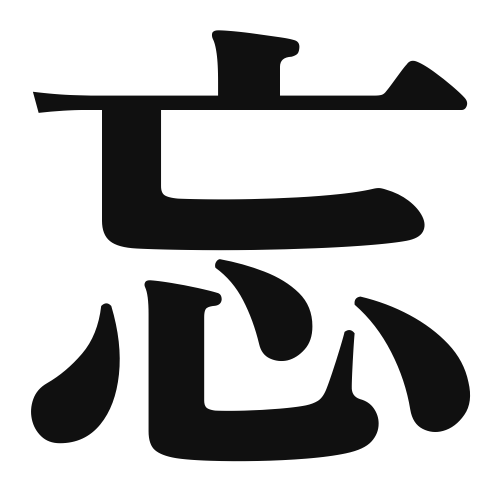1. Overview of Meaning
The kanji “忘” (pronounced “wàng” in Mandarin and “wasu” in Japanese) means “to forget.” It conveys the idea of losing memory or failing to remember something.
2. Formation and Radicals
Formation of the Kanji: The kanji “忘” is a combination of two components: the radical “亡” (meaning “to perish” or “to disappear”) and “心” (meaning “heart” or “mind”). This suggests the idea of something disappearing from the mind.
Radical: The radical of “忘” is “心” (or “忄” when written in its variant form), which relates to emotions and thoughts.
3. Examples of Usage
Common Words and Phrases: Some common words that include “忘” are “忘れ物” (wasuremono – forgotten item) and “忘年会” (bōnenkai – year-end party).
Example Sentences in Daily Conversation:
- 「宿題を忘れた。」(Shukudai o wasureta.) – “I forgot my homework.”
- 「彼は私の名前を忘れてしまった。」(Kare wa watashi no namae o wasurete shimatta.) – “He forgot my name.”
4. Synonyms and Antonyms
Similar Kanji: A similar kanji is “失” (shitsu), which means “to lose.” While “忘” refers specifically to forgetting something, “失” implies a broader sense of loss.
Opposite Kanji: The opposite of “忘” is “覚” (kaku), which means “to remember” or “to recall.” This highlights the contrast between forgetting and remembering.
5. Cultural and Historical Background
Relation to Japanese Culture: In Japanese culture, forgetting is often associated with the transient nature of life, as seen in various literary works and philosophies.
Proverbs and Idioms: One common saying is “忘却は幸福の母” (Bōkyaku wa kōfuku no haha), which translates to “Forgetfulness is the mother of happiness,” suggesting that forgetting past troubles can lead to a happier life.
